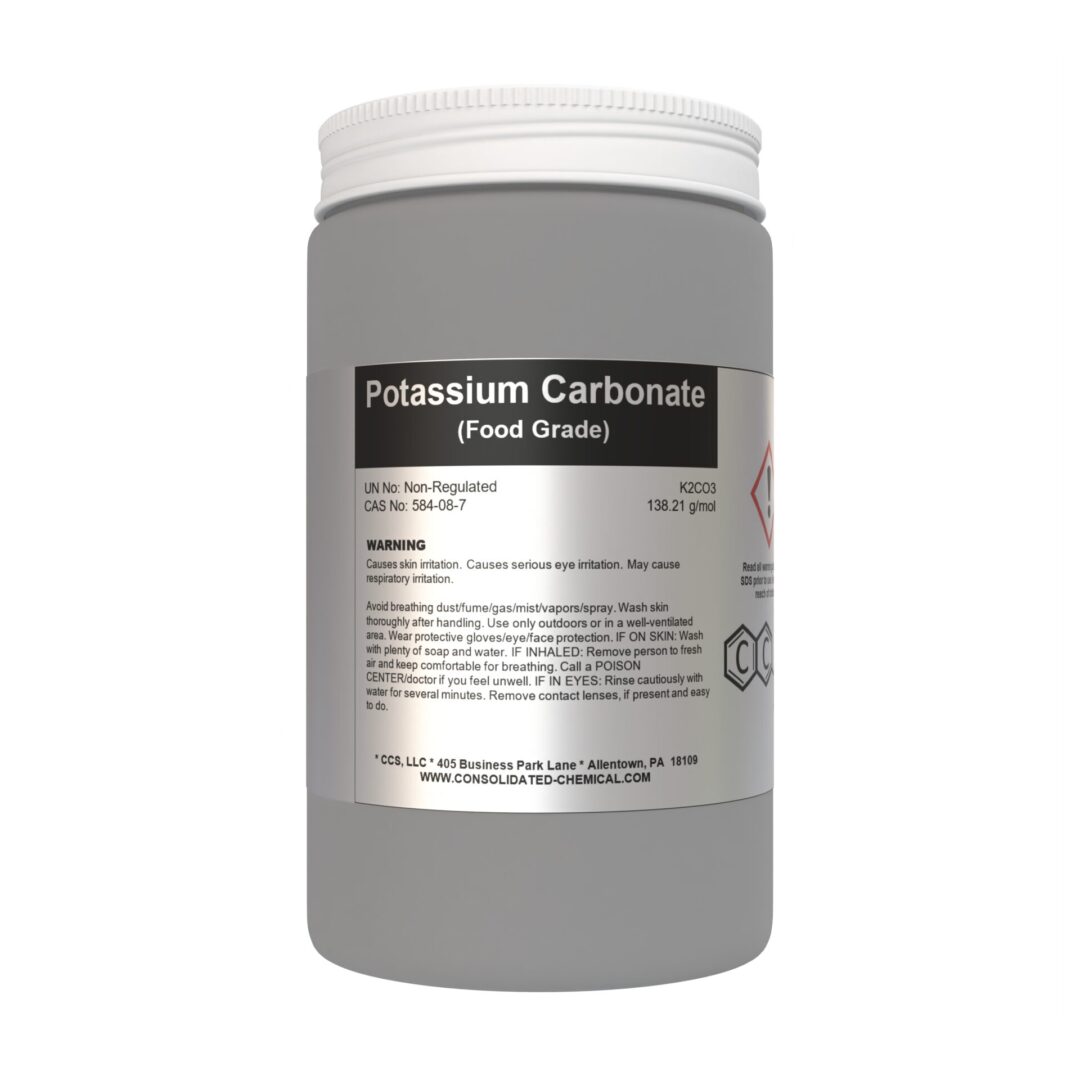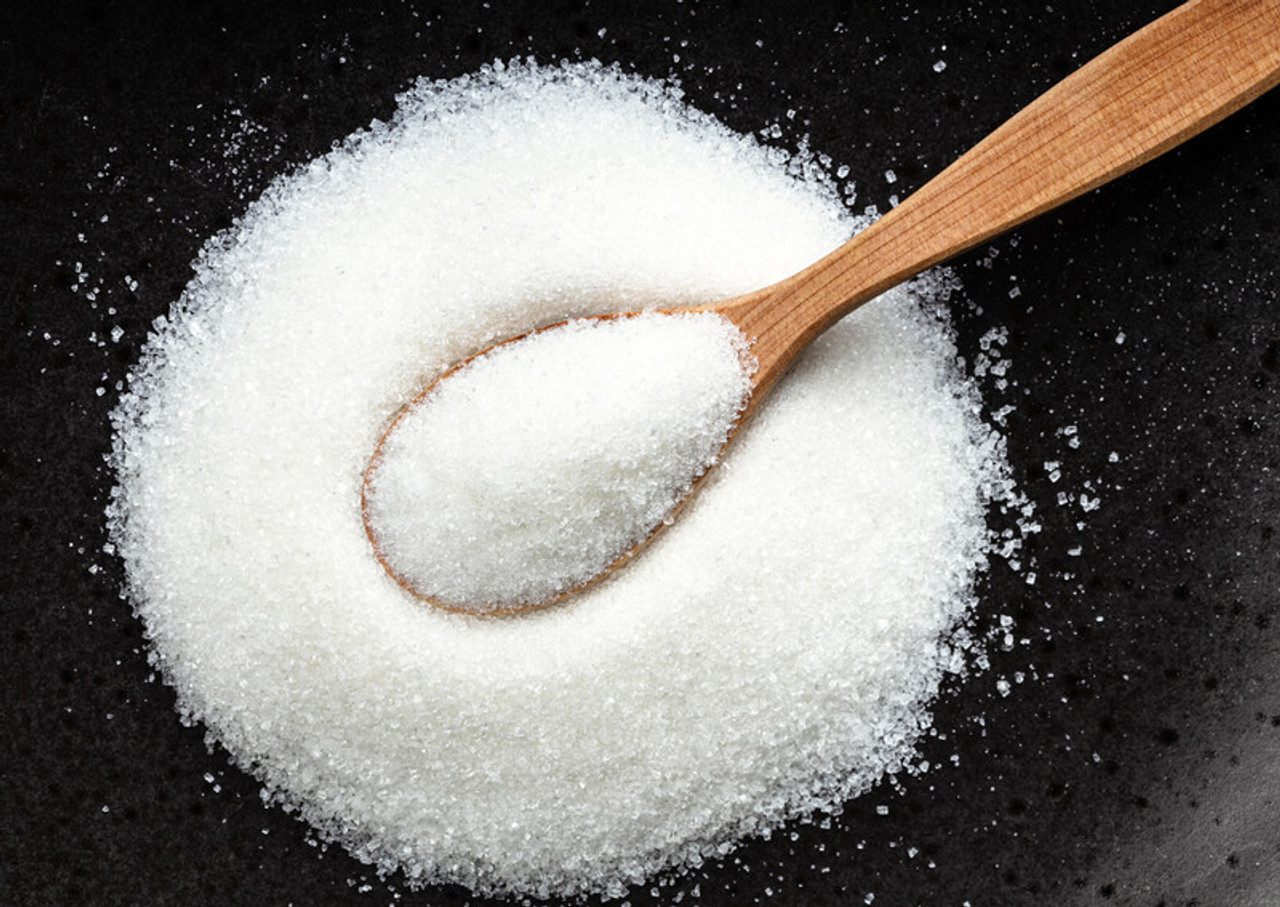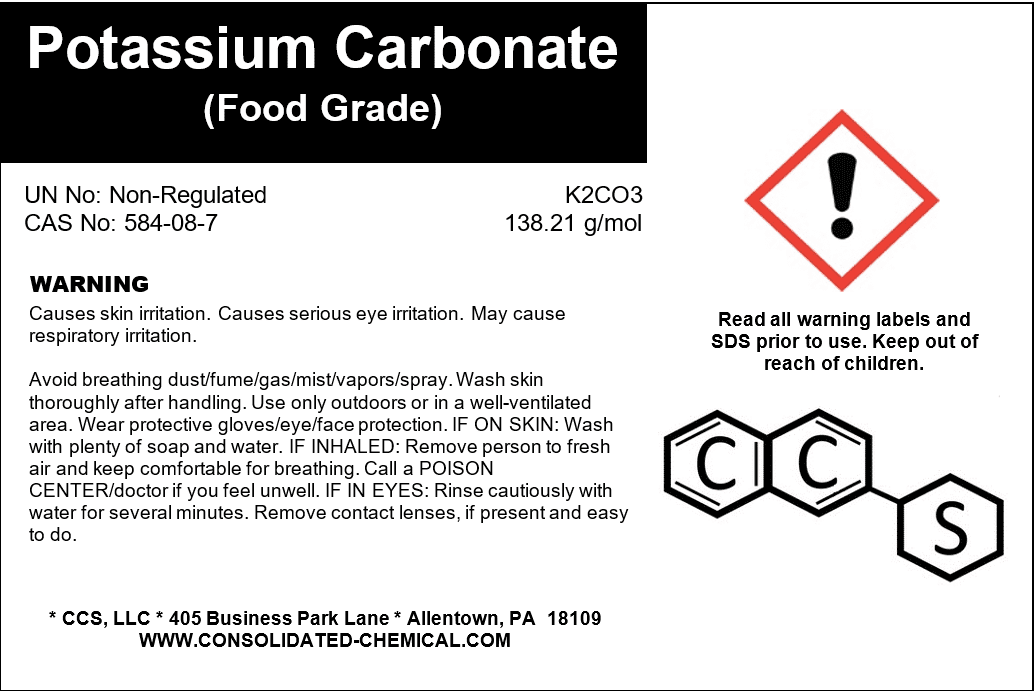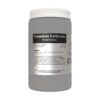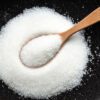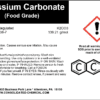Potassium Carbonate – Food Grade (E501)
$24.99 – $39.99
Technical Specifications for Potassium Carbonate (Food Grade)
- Chemical Name: Potassium Carbonate
- CAS Number: 584-08-7
- Molecular Formula: K₂CO₃
- Molecular Weight: 138.21 g/mol
- Appearance: White crystalline powder or granules
- Odor: Odorless
- Grade: Food Grade (E501)
- Purity: ≥ 99% (depending on food-grade certification)
- Density: 2.43 g/cm³
- Melting Point: 891°C (1,636°F)
- Solubility:
- Highly soluble in water (110 g/100 mL at 20°C)
- Insoluble in ethanol and acetone
- pH (1% solution): ~11.5
- Hygroscopic: Absorbs moisture from the air; store in sealed containers.
Compliance:
- Food Safety Standards: Meets FCC, E501 (EU Food Additive Code), and other global food safety standards.
Documents: Safety Data Sheet (SDS)
Description
Potassium Carbonate (E501) is a high-quality, food-grade compound used as a pH regulator, leavening agent, and stabilizer in the food and beverage industry. This versatile, odorless white crystalline powder or granule is valued for its high solubility, strong alkalinity, and non-toxic properties. Potassium Carbonate is commonly used in cocoa processing, noodle production, and beverage formulations to enhance quality and consistency.
Applications of Potassium Carbonate (Food Grade):
Industrial Applications
- Glass Manufacturing:
- Acts as a flux in the production of specialty glasses such as optical, television, and laboratory glasses.
- Soap and Detergents:
- Used as a builder or buffering agent to improve cleaning efficiency in soaps and liquid detergents.
- Ceramics:
- Enhances the strength and quality of ceramics and pottery during manufacturing.
- Chemical Manufacturing:
- Precursor in the production of potassium-based chemicals, such as potassium silicates and potassium cyanide.
Food and Beverage Industry
- Food Additive (E501):
- Used as a pH regulator, buffering agent, and leavening agent in baking.
- Cocoa Processing:
- Helps reduce the natural acidity of cocoa beans (alkalization), enhancing flavor and color.
- Brewing:
- Regulates acidity and acts as a source of potassium in brewing processes.
- Gelatin Production:
- Serves as a stabilizer in gelatin and other food products.
Agriculture
- Fertilizers:
- Source of potassium, an essential nutrient for plant growth.
- Animal Feed:
- Provides potassium in feed formulations for livestock and poultry.
Pharmaceuticals
- Active Ingredient:
- Used in some medications as an electrolyte replenisher.
- pH Regulator:
- Maintains alkalinity in pharmaceutical formulations.
Water Treatment
- Softening and pH Control:
- Neutralizes acidity in water and prevents scaling in boilers and pipelines.
- Electrolyte in Electrolysis:
- Used in specific water treatment processes.
Textiles and Dyeing
- Fabric Preparation:
- Used in textile finishing to soften water and aid in scouring.
- Dye Fixation:
- Improves the fixation of dyes on fabrics by adjusting alkalinity.
Cleaning and Soapmaking
- Industrial Cleaners:
- Found in heavy-duty cleaning agents due to its alkaline and water-softening properties.
- Soap Production:
- Acts as an essential alkali in making liquid soaps.
Laboratory and Research
- Buffering Agent:
- Commonly used in laboratory settings to maintain pH levels in solutions.
- Reagent:
- Utilized in various chemical reactions, including the synthesis of potassium compounds.
Personal Care
- Cosmetics:
- Occasionally used as a pH adjuster in formulations like shampoos and skin products.
Fire Suppression
- Fire Extinguishers:
- Utilized in certain dry chemical fire extinguishers due to its ability to smother flames.
Storage and Handling:
- Storage Conditions:
- Store in a cool, dry, and well-ventilated area.
- Keep in tightly sealed, moisture-resistant containers to prevent clumping or degradation.
- Avoid exposure to acids, as this can release carbon dioxide gas.
- Shelf Life: Approximately 2 years under recommended storage conditions.
Additional information
| Size | 1 Kilogram (2.2 Lbs), 2 Kilogram (4.4 Lbs) |
|---|
Related products
-

Vanillin (Artificial Vanilla) | Premium Quality 100% Pure
$12.00 – $24.99 Select options This product has multiple variants. The options may be chosen on the product page -
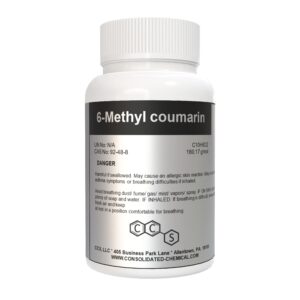
6-Methyl Coumarin | High-Purity Aroma & Industrial Compound
$12.99 – $19.99 Select options This product has multiple variants. The options may be chosen on the product page -
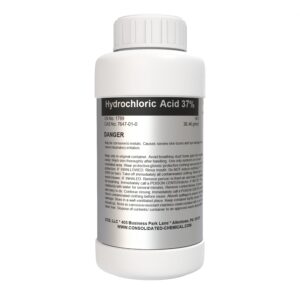
Hydrochloric Acid 37% Premium ACS Reagent Grade
Rated 3.00 out of 5$14.99 – $57.00 Select options This product has multiple variants. The options may be chosen on the product page -
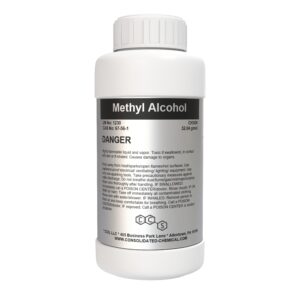
Methyl Alcohol (Methanol) – Premium Multi-Purpose Solvent
$12.99 – $70.00 Select options This product has multiple variants. The options may be chosen on the product page
SKU: 6614
Categories: Fertilizer, Fertizlizer Additive, Food Additive, Industrial Chemical, pH Regulator
Tags: Alkaline Compound, Baking Ingredient, Beverage Additive, Chemical Intermediate, Cleaning Agent, Cocoa Processing Agent, Detergent Raw Material, E501 Additive, Food Grade Potassium Carbonate, Glass Manufacturing, Industrial Potassium Carbonate, Laboratory Reagent, Leavening Agent, Noodle Production, Pearl Ash, pH Regulator, Potash, Potassium Carbonate, potassium carbonate acidity regulator, potassium carbonate Alibaba, potassium carbonate alkali, potassium carbonate alkaline processing agent, potassium carbonate alternative applications, potassium carbonate alternative uses, potassium carbonate Amazon, potassium carbonate analytical reagent, potassium carbonate B2B marketplace, potassium carbonate biodegradable, potassium carbonate boiling point, potassium carbonate bulk, potassium carbonate bulk supplier, potassium carbonate CAS 584-08-7, potassium carbonate chemical, potassium carbonate chemical synthesis, potassium carbonate competitive pricing, potassium carbonate controlled-release applications, potassium carbonate cosmetic-grade, potassium carbonate crystalline, potassium carbonate demand, potassium carbonate density, potassium carbonate distributor, potassium carbonate e-commerce, potassium carbonate E501, potassium carbonate eBay, potassium carbonate eco-friendly, potassium carbonate emerging applications, potassium carbonate extended stability, potassium carbonate food additive, potassium carbonate food grade, potassium carbonate food-safe, potassium carbonate for dough conditioning, potassium carbonate for flavor enhancement, potassium carbonate for pH adjustment, potassium carbonate for pH control, potassium carbonate formula, potassium carbonate GHS classification, potassium carbonate global market, potassium carbonate granules, potassium carbonate handling, potassium carbonate high-performance food additive, potassium carbonate high-purity, potassium carbonate hygroscopic, potassium carbonate import export, potassium carbonate in agriculture, potassium carbonate in alkaline batteries, potassium carbonate in alkaline foods, potassium carbonate in animal feed, potassium carbonate in baking, potassium carbonate in beer production, potassium carbonate in beverage manufacturing, potassium carbonate in biofuels, potassium carbonate in boiler treatment, potassium carbonate in brewing, potassium carbonate in caramel production, potassium carbonate in carbon capture, potassium carbonate in ceramics, potassium carbonate in cheese making, potassium carbonate in cheese production, potassium carbonate in cleaning products, potassium carbonate in cocoa processing, potassium carbonate in conditioners, potassium carbonate in confectionery, potassium carbonate in cosmetics, potassium carbonate in dairy products, potassium carbonate in detergent production, potassium carbonate in drug formulations, potassium carbonate in electroplating, potassium carbonate in environmental applications, potassium carbonate in excipients, potassium carbonate in fertilizers, potassium carbonate in food processing, potassium carbonate in food safety, potassium carbonate in glass manufacturing, potassium carbonate in green chemistry, potassium carbonate in herbicides, potassium carbonate in hydroponics, potassium carbonate in industrial cleaners, potassium carbonate in lab applications, potassium carbonate in laboratory applications, potassium carbonate in lotions, potassium carbonate in meat processing, potassium carbonate in noodles, potassium carbonate in nutritional supplements, potassium carbonate in organic chemistry, potassium carbonate in personal care, potassium carbonate in pesticides, potassium carbonate in pharmaceutical applications, potassium carbonate in pretzels, potassium carbonate in processed foods, potassium carbonate in ramen, potassium carbonate in rubber manufacturing, potassium carbonate in scientific research, potassium carbonate in shampoos, potassium carbonate in skincare, potassium carbonate in snacks, potassium carbonate in soaps, potassium carbonate in soy sauce, potassium carbonate in specialty foods, potassium carbonate in textile processing, potassium carbonate in water treatment, potassium carbonate in winemaking, potassium carbonate industrial applications, potassium carbonate industrial sales, potassium carbonate industrial supply, potassium carbonate industrial-grade, potassium carbonate industry trends, potassium carbonate innovations, potassium carbonate IUPAC name, potassium carbonate lab reagent, potassium carbonate long shelf life, potassium carbonate manufacturer, potassium carbonate market growth, potassium carbonate melting point, potassium carbonate molecular formula, potassium carbonate molecular weight, potassium carbonate MSDS, potassium carbonate non-toxic, potassium carbonate odorless, potassium carbonate organic synthesis, potassium carbonate oxidation resistance, potassium carbonate pH, potassium carbonate pH stabilizer, potassium carbonate pharmaceutical-grade, potassium carbonate price, potassium carbonate procurement, potassium carbonate quality assurance, potassium carbonate raw material, potassium carbonate REACH compliance, potassium carbonate regulatory compliance, potassium carbonate safety data, potassium carbonate SDS, potassium carbonate solubility, potassium carbonate sourcing, potassium carbonate specialty chemical, potassium carbonate storage, potassium carbonate strong base, potassium carbonate structure, potassium carbonate superior performance, potassium carbonate supplier, potassium carbonate sustainable, potassium carbonate synonyms, potassium carbonate technical specifications, potassium carbonate trade, potassium carbonate transportation, potassium carbonate Walmart, potassium carbonate white powder, potassium carbonate wholesale, potassium carbonate worldwide shipping, Water Softening Agent, Water-Soluble Salt


